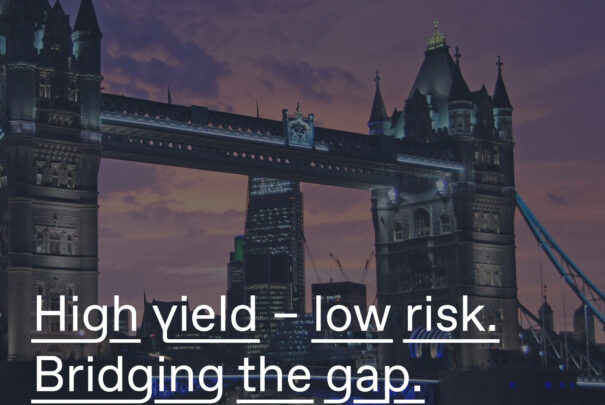Risk averse investors hungry for yield face slim pickings in today’s fixed income environment. Traditional “safety net” instruments like money market and most G20 treasury yields are below 1%, and banks now act like warehouses for money, charging depositors for storage instead of paying interest. Bonds have shown extreme volatility especially during the pandemic and have proven a shaky option for investors with an allergy to rollercoaster values.
An alternative and innovative option, namely bridge financing, has organically evolved in the UK into a 7-billion-pound industry during the last 10 years.
Bridge financing, a progressive and direct approach for lenders and borrowers to arrange quick and flexible loans, enables businesses to bypass lengthy bureaucratic lending processes and the ongoing credit crunch at mainstream banks.
Besides providing a financing solution to businesses, bridge financing is an alternative product for investors, that delivers target returns upwards of 5% p.a. in GBP or USD, with minimal risk.
How it’s done
An investor selects and participates in loans which have already been underwritten, approved, and granted by the bridge financing company, which is the lender. This gives the investor contractual rights to a return of capital plus fixed income on the selected loans. Simply put, the investor purchases a portion of the fixed rate return from the loan. The loans are usually less than 12 months.
The product may also be accessed through licensed and regulated Alternative Investment Funds giving the investor additional advantages of risk diversification through a basket of loans held by the fund. Funds may include options such as quarterly dividends, with usual minimum investment periods of 1 year and monthly liquidity thereafter.
How is the investment protected?
The capital portion of the investment as well as related accrued interest is secured by a first charge over specific UK real estate, which puts the bridge financing company first in line of creditors in the event of complications. The Loan to Value (LTV) which is lower than the security property market value, protects the investment by giving a safety cushion in case the property needs to be sold during possible market downturns.
In more detail, independent valuers and lawyers with professional indemnity insurance are engaged to value and investigate the property extensively prior to releasing the funds. In addition, the bridge finance company does its own rigorous valuation and investigation. All loans are initially granted by the lender itself, and all security properties are insured in favour of the lender for the duration of the loan term.
Thanks to UK legislation, for loans secured by real estate, which is not the primary residence of the borrower, the rights of the lender to the sale of the security property in the case of default are pre-established and require no court procedures or in fact any kind of additional permission or agreement from anyone to exercise those rights. In default cases, the property goes to auction for sale and subsequent settlement of the loan and interest due. The time it takes to sell the security and recoup the capital and interest in such cases is around 4 months.
Furthermore, in the case of bridge financing in the Greater London residential property market, you have as your security prime real estate located in one of the most mature, transparent, and liquid property markets in the world. If properties accepted as security are already built, commercially viable properties, this ensures that all security properties can be sold quickly if necessary.
What is the return?
This product can provide the investor with an annualized target income of 5%+ in GBP or USD, and 4%+ in Euro.
In a period where yields in mid-single digits without tangible risk are few, a highly secure short-term product which delivers target returns of 5%+ in GBP or USD is a great way to achieve a solid return as well as providing prudent diversification and risk management for your portfolio.
And if crisis provides opportunities, it also provides good reason to look around for alternatives.
Dmitry Khenkin
Director, FCCA, Investment Advisor
